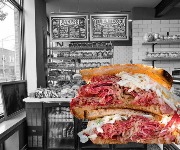Are these really the most influential people in food and drink?

A new list of the 500 ‘most influential’ people in Britain has been released, including chefs and food critics.
Twenty-three figures from the food and drink industry have made it onto a list of the 500 most influential people in Britain today.
The list has been compiled by society champions Debrett’s, with the help of appointed panels of experts for every category.
What’s the idea?
The 500 names are taken from across the broadest spectrum of modern life possible, in an attempt to reflect the make-up of our society and list the most important people in each sector.
They are recognised for their contributions to influencing and shaping their industry.
Can you rely on it?
The Debrett’s 500 list is something of an oddity. Debretts describes it as a compilation of “truly inspiring people” and a “positive endorsement and recognition of Britain’s 500 most influential people.”
But in the act of drawing up a list of important people, it enters a complete circle of self-reflexivity, where those named are now seen as ‘influential’ by virtue of being on the list.
Sunday Times writers Gizzi Erskine and Oliver Thring led the food and drink panel.
And if these two have a major say in naming influential people, then they themselves are shaping the status quo rather more formally than any of the people they name. Surely then, they should also be on the list as the guiding hands who tell us who is important in the first place?
To actually return to food (finally, sorry) I wonder how many names on the list actually have an impact on our lives? Some among the list, for instance Jamie Oliver and Mary Berry, usually make many TV appearances a year and probably do make a difference to people’s lives and habits. But it’s those who are far more removed from the public eye that are rather more intriguing.
A CEO
Take Ewan Venters, for example. He is the Chief Executive Officer of department store Fortnum & Mason, and though he arguably has a large amount of sway over other luxury department stores, it’s debatable how much direct influence he has over anything else.
Though the prestige of the company is obvious, there’s a limited market to be had by the store due to its price bracket. For most, it’s a curiosity rather than a viable option. And since F&M has come under fire for its sales of foie gras, it’s arguably not influential but actually a shop that is swimming against the tide of public opinion.
A chef
Heston Blumenthal also makes the list. His cooking is well respected and he is very well known. But is he influential in everyday life? No doubt, his food influences other chefs and there is an amount of ‘trickle down’ to the home cook.
However, his recipes, albeit delicious, tend to be convoluted and complicated, involving items and methods that few of us have the time, and sometimes the equipment or money, to pull off at home.
While he’s influential, it’s difficult to say how much that influence exerts itself over the country at large as opposed to professional chefs with similar aims. His range of food sold at Waitrose might help keep his name in the public eye, but the products that bear his name don’t assert ‘influence’ in the same way as the man himself.
A critic
A A Gill is on the list, and is definitely a well-known (and revered/feared) figure in food and drink. As a critic, he shapes public opinion of restaurant dining more than people’s home kitchen habits, and his writing is disseminated fairly widely as he writes for the Sunday Times and Vanity Fair.
That said, accepting any critic’s word at face-value is entering into a passive relationship, and I believe that with the wealth of information at our fingertips these days, we’re far more likely to look into an opinion, seeking cues to reinforce or invalidate one critic’s opinion with another’s. “We’re all critics now,” the saying goes, and it’s true.
Review sites are among the most popular on the web, while millions of us actively comment on articles and interact with our peers and their opinions, online, in real time. And that free flow of information has seriously undermined the power of critics – and the authority of lists like the Debrett’s 500.
Do you think the Debrett’s 500 list is relevant? Who would you name as being most influential in the field of food and drink? Let us know in the Comments below.
You might also like:
10 recipes that changed the world
Most Recent
Comments
Be the first to comment
Do you want to comment on this article? You need to be signed in for this feature








